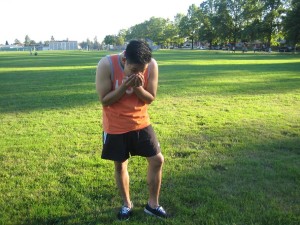Respiratory syncytial virus is considered as a common cold virus. Nevertheless, the effects of the virus on young children is severe than the adults. In studies conducted, almost every child can become infected with RSV by the time he/she is 1 year old.
Some children could not clear mucous from their nasal passages and airways, thus inhibiting breathing. In addition to the issue, most infants are nose breathers so they cannot or do not know how to breath via the mouth.
What are the symptoms of RSV?
If an individual is suspected with respiratory syncytial virus infection, you have to watch out for the following symptoms.
- Sneezing episodes
- Runny nose
- Fever
- Reduced appetite
- Irritability
- Breathing difficulty such as wheezing
- Diminished activity level and fatigue

When to consult a doctor?
Careful monitoring of the child is vital if he/she has common cold. The following can indicate that the child requires medical care.
- Child refuses to drink or eat accompanied by a decrease in the number of soiled diapers in a day.
- High fever that stays uncontrolled after receiving over-the-counter fever medications such as ibuprofen.
- Extreme lethargy (significant decline in usual activity and/or sleeping excessively)
- Struggling to breathe as manifested by gray or bluish skin coloration, wheezing, gasping or increased respiratory rate.
Once any of these are present, do not hesitate to consult a doctor for proper assessment of the condition.
Treatment of respiratory syncytial virus
Always bear in mind that the treatment for respiratory syncytial virus focuses on symptoms in mild cases. As for severe cases, the treatment can include the following:
- Administration of oxygen
- Providing medications that dilate the bronchi such as albuterol
- Suctioning of the nasal passages and rear part of the throat to eliminate excess mucus that accumulated
- Administration of intravenous fluids to rehydrate as well as thin out secretions
- Intubation and placement on a mechanical ventilator
How to prevent RSV
It is important to note that the respiratory syncytial virus is spread through nasal secretions and saliva once sneezed or coughed out and then inhaled by others. The condition also spreads by drinking from an infected person’s cup or glass, kissing or using infected utensils.
The virus can thrive on surfaces such as cribs and kitchen countertops for hours. Proper hand washing and disinfection of household surfaces are vital measures in order to prevent the spread of the virus.
There is one medication given to high-risk children but can only prevent the infection of severe RSV. In addition, it could not help out those who are already infected. Most healthy individuals can fight off the respiratory syncytial virus without requiring medical care. Just remember though that some children and high-risk individuals who have weakened immune systems due to cancer treatment, HIV infection or old age would require hospitalization. As long as proper treatment is given, most individuals with respiratory syncytial virus infections can achieve full recovery over time.
